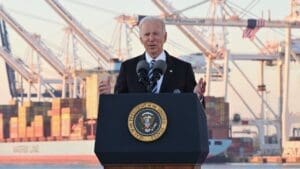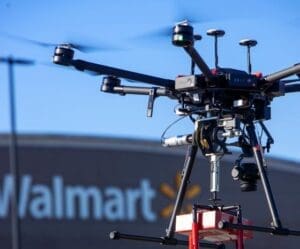 This weekend the PGA Championship, the second of the 4 Majors, is taking place in Louisville, KY. Heading into the tournament, all eyes were on Scottie Scheffler, the world’s number 1 ranked golfer, winner of four of his last five tournaments including the Masters, and one of the favorites to win his third major. This morning, however, all eyes are on Scottie Scheffler for another reason. Early this morning, Scheffler was arrested by Louisville Metro Police on Friday morning after trying to drive into the entrance of Valhalla Golf Club, the site of this week’s PGA Championship. The second round of play at Valhalla had been delayed after a pedestrian was struck and killed near the entrance to the golf course, resulting in significant police activity in the area. Scheffler was trying to drive around the crash scene on a median. A police officer instructed Scheffler to stop, but Scheffler continued to drive about 10 to 20 yards toward the entrance. At one point, an officer attached himself to the side of Scheffler’s car. One the car stopped, Scheffler was removed from the vehicle and place under arrest. Scheffler faces charges of second-degree assault of a police officer, third-degree criminal mischief, reckless driving, and disregarding traffic signals from an officer directing traffic. Scheffler was released at 8:40 am and headed to Valhalla. The assault charge is a felony, the others are misdemeanors. And now on to this week’s logistics news.
This weekend the PGA Championship, the second of the 4 Majors, is taking place in Louisville, KY. Heading into the tournament, all eyes were on Scottie Scheffler, the world’s number 1 ranked golfer, winner of four of his last five tournaments including the Masters, and one of the favorites to win his third major. This morning, however, all eyes are on Scottie Scheffler for another reason. Early this morning, Scheffler was arrested by Louisville Metro Police on Friday morning after trying to drive into the entrance of Valhalla Golf Club, the site of this week’s PGA Championship. The second round of play at Valhalla had been delayed after a pedestrian was struck and killed near the entrance to the golf course, resulting in significant police activity in the area. Scheffler was trying to drive around the crash scene on a median. A police officer instructed Scheffler to stop, but Scheffler continued to drive about 10 to 20 yards toward the entrance. At one point, an officer attached himself to the side of Scheffler’s car. One the car stopped, Scheffler was removed from the vehicle and place under arrest. Scheffler faces charges of second-degree assault of a police officer, third-degree criminal mischief, reckless driving, and disregarding traffic signals from an officer directing traffic. Scheffler was released at 8:40 am and headed to Valhalla. The assault charge is a felony, the others are misdemeanors. And now on to this week’s logistics news.

 The Biden administration announced stiff new tariff rates Tuesday on $18 billion worth of Chinese imports. The White House said the tariff hikes were necessary to protect American industries from unfair competition. Starting this year, President Joe Biden will quadruple tariffs on imported Chinese electric vehicles, from 25% to 100%. The import tax on Chinese solar cells will double, from 25% to 50%. And tariffs on some Chinese steel and aluminum imports will increase more than three-fold, from 7.5% today up to 25%. The president also directed U.S. Trade Representative Katherine Tai to more than triple the tariff rates on lithium-ion batteries for EVs and lithium batteries meant for other uses. Starting in 2025, tariffs on imported Chinese semiconductors will jump from 25% to 50%.
The Biden administration announced stiff new tariff rates Tuesday on $18 billion worth of Chinese imports. The White House said the tariff hikes were necessary to protect American industries from unfair competition. Starting this year, President Joe Biden will quadruple tariffs on imported Chinese electric vehicles, from 25% to 100%. The import tax on Chinese solar cells will double, from 25% to 50%. And tariffs on some Chinese steel and aluminum imports will increase more than three-fold, from 7.5% today up to 25%. The president also directed U.S. Trade Representative Katherine Tai to more than triple the tariff rates on lithium-ion batteries for EVs and lithium batteries meant for other uses. Starting in 2025, tariffs on imported Chinese semiconductors will jump from 25% to 50%.
The latest data from S&P Global Market Intelligence shows that U.S. supply chain activity slowed in April. According to S&P Global, seaborne containerized freight imports into the U.S. rose by 8% year-over-year in April, after a 16% increase in March. That was largely due to a slowdown in consumer durable goods like home furnishings and household appliances, which saw a meager 2% increase in April. S&P Global also points to a “mixture of physical, political and labor reasons,” with the looming threat of an East Coast port strike paired with ongoing disruptions in Red Sea shipping lanes. Diversions from East Coast ports leading to rising rail dwell times on the West Coast could trigger “imbalances in the logistics network” in the months to come as well. Meanwhile, recent numbers from Freightos indicate that Red Sea disruptions have caused freight rates for ocean carriers to skyrocket since the start of May, rising by $1,000 per 40-foot-equivalent units. On May 6, Maersk warned that the risk zone in the Red Sea had expanded, predicting impacts to persist through most of the year.
A group of states that loosely parallels those that filed suit last year to stop California’s Advanced Clean Trucks (ACT) rule have taken similar action against the state’s Advanced Clean Fleets (ACF) rule, seeking to stop the ACF while it awaits a waiver from the Environmental Protection Agency. A key difference between the suits is the defendant. The action filed Monday in U.S. District Court for the Eastern District of California is against Steven Cliff, the executive officer of the California Air Resources Board. The suit against ACT filed last June was against the EPA, which already had granted California a waiver to implement the Clean Trucks rule. ACT targets manufacturers of trucks; ACF targets companies that buy and drive them. In tandem, the rules aim to achieve a fully zero-emission-vehicle (ZEV) fleet in California by the mid-2040s.
Uber Technologies will acquire the Taiwan business of Delivery Hero-owned Foodpanda for $950 million in cash, as Foodpanda focuses on other markets. The deal, subject to regulatory approval, is expected to close in the first half of 2025, the firms said in a joint statement on Monday. In a separate agreement, Delivery Hero will sell $300 million in newly issued ordinary shares to Uber. Pierre-Dimitri Gore-Coty, senior vice president of delivery at Uber, said the Taiwan market is “fiercely competitive” and the acquisition would help them grow in the market “where online food delivery platforms today still represent just a small part of the food delivery landscape.” Foodpanda is one of the largest online food and grocery delivery platforms in Asia with a presence in markets including Singapore, Malaysia, Thailand, The Philippines and Hong Kong. In 2016, Germany’s Delivery Hero acquired the company.

 Walmart’s drone delivery service is taking flight at a greater number of stores as the world’s biggest retailer aims to rule not just retail but the skies as well. The Arkansas-based company said that it is now offering its drone delivery service for up to 75% of the Dallas-Fort Worth (DFW), Texas population and, the company said at the start of the year, is “building on our momentum with the largest drone delivery footprint of any U.S. retailer.” Walmart has been working with a number of partners over the past three years or so and most recently in Dallas with Wing, the drone technology subsidiary of Google parent Alphabet, plus Zipline. It initially launched drone-based deliveries from three stores in Northwest Arkansas as far back as late 2021.
Walmart’s drone delivery service is taking flight at a greater number of stores as the world’s biggest retailer aims to rule not just retail but the skies as well. The Arkansas-based company said that it is now offering its drone delivery service for up to 75% of the Dallas-Fort Worth (DFW), Texas population and, the company said at the start of the year, is “building on our momentum with the largest drone delivery footprint of any U.S. retailer.” Walmart has been working with a number of partners over the past three years or so and most recently in Dallas with Wing, the drone technology subsidiary of Google parent Alphabet, plus Zipline. It initially launched drone-based deliveries from three stores in Northwest Arkansas as far back as late 2021.
UPS and FedEx are battling to win a larger share of the small shipper segment as major customers in-source their deliveries, switch to new providers and grapple with market declines. Small- and medium-sized businesses are driving much of the volume growth in the business-to-consumer delivery space and their deliveries are typically more profitable for the carriers than large-scale customers. That makes them a prime target for delivery providers amid a soft demand environment. To meet these shippers’ needs, both UPS and FedEx have launched an array of initiatives in recent years they hope will capture a larger share of the valuable customer segment.

 The U.S. Postal Service is pausing the consolidation of mail processing operations at least until after Jan. 1, 2025, as lawmakers scrutinize the plan’s impact on delivery reliability. The agency will put the transfer of some mail processing operations at local plants throughout the country to larger regional hubs on hold, Postmaster General Louis DeJoy said in a May 9 letter to Sen. Gary Peters, D-Mich. Even after Jan. 1, the Postal Service will only proceed “at a moderated pace of implementation.” The Postal Service CEO said he hopes the pause “will work to restore confidence in the desired positive outcomes of our modernization actions are meant to achieve from both a service excellence and cost savings perspective, and at a pace of network change that is acceptable.”
The U.S. Postal Service is pausing the consolidation of mail processing operations at least until after Jan. 1, 2025, as lawmakers scrutinize the plan’s impact on delivery reliability. The agency will put the transfer of some mail processing operations at local plants throughout the country to larger regional hubs on hold, Postmaster General Louis DeJoy said in a May 9 letter to Sen. Gary Peters, D-Mich. Even after Jan. 1, the Postal Service will only proceed “at a moderated pace of implementation.” The Postal Service CEO said he hopes the pause “will work to restore confidence in the desired positive outcomes of our modernization actions are meant to achieve from both a service excellence and cost savings perspective, and at a pace of network change that is acceptable.”
That’s all for this week. Enjoy the weekend and the song of the week, Breaking the Law by Judas Priest.




















